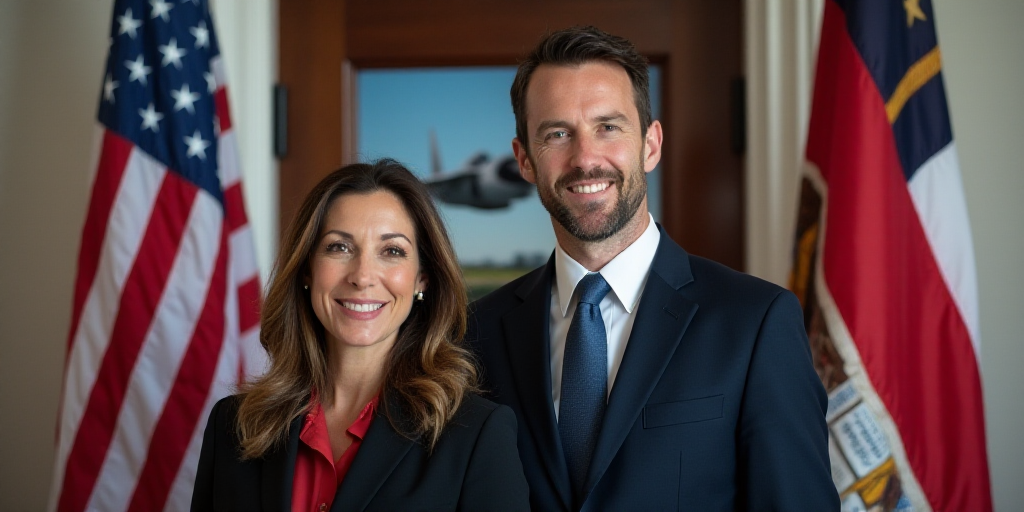Meeting with USDA’s Animal and Plant Health Inspection Service Director
The Governor of Chihuahua, Maru Campos, met with Michael Walton, the Director of the Animal and Plant Health Inspection Service (APHIS) under the United States Department of Agriculture (USDA), in Washington D.C. to inform about her government’s key actions against the Cattle-Barren Worm (GBG).
Background on Maru Campos and her Relevance
Maru Campos is the current Governor of Chihuahua, a state in north-central Mexico. As the chief executive of one of Mexico’s largest states by area, she plays a crucial role in addressing regional issues, including agricultural and livestock concerns. Her recent efforts to combat the GBG have gained national attention, especially given the recent U.S.-Mexico border closure for Mexican exports.
Context and Impact of the GBG
The Cattle-Barren Worm (GBG) is a significant threat to the cattle industry in southern Mexico, with recent detections in six states prompting concerns. The worm can cause severe economic losses and production declines in affected herds, impacting both local farmers and international trade. The border closure by the United States has heightened the urgency for collaborative efforts to control and eradicate this pest.
Key Actions Taken by Chihuahua’s Government
- Formation of a State Group for GBG Control: Governor Campos established a state group dedicated to controlling the spread of the Cattle-Barren Worm. This collaborative effort aims to develop and implement strategies for prevention, control, and surveillance.
- Training of 3,400 Producers: The government has trained livestock producers in 46 municipalities to recognize and manage the GBG, enhancing their capacity to protect their herds.
- Systematic Inspections: Regular inspections are conducted to identify potential infestations early, allowing for prompt intervention and minimizing the worm’s impact.
- Hiring of Certified Professionals: Specialized professionals have been contracted to address the GBG issue, ensuring proper management and containment of the pest.
Collaboration with U.S. Authorities
Governor Campos emphasized the importance of working alongside U.S. authorities to strengthen sanitary surveillance and maintain Chihuahua’s GBG-free status. She highlighted that local exporters are vital in safeguarding the health of their cattle, making their collaboration essential for success.
The meeting with Michael Walton and the Chihuahua government’s commitment to sharing information, best practices, and technology with the U.S. aims to create a robust containment mechanism in the region.
Additional Meetings and Support
During her work trip, Governor Campos also met with Esteban Moctezuma, Mexico’s Ambassador to the United States. This meeting aimed to inform the ambassador about Chihuahua’s ganadera efforts, particularly those focused on GBG eradication and garnering support for these initiatives.
Accompanying Governor Campos during these meetings were key officials such as the Secretary of Rural Development, Mauro Parada; her Chief of Staff, Fernando Álvarez Monje; Álvaro Bustillos, President of the Regional Livestock Union of Chihuahua; and Arturo Sarukhán, former Mexican Ambassador to the United States.
Key Questions and Answers
- Who met with Michael Walton? Governor Maru Campos of Chihuahua met with Michael Walton, the Director of the Animal and Plant Health Inspection Service (APHIS) under the USDA.
- What was the purpose of their meeting? The meeting aimed to inform about Chihuahua’s actions against the Cattle-Barren Worm (GBG) and strengthen bilateral collaboration in the ganadera sector.
- What actions has Chihuahua’s government taken against GBG? Key actions include forming a state group for GBG control, training 3,400 producers, conducting systematic inspections, and hiring certified professionals.
- How is Chihuahua collaborating with the U.S.? Chihuahua is working with U.S. authorities to enhance sanitary surveillance, share information and best practices, and maintain the state’s GBG-free status.
- Who else was involved in the meetings? Other participants included Mexico’s Ambassador to the U.S., Esteban Moctezuma, as well as key officials from Chihuahua’s government.






